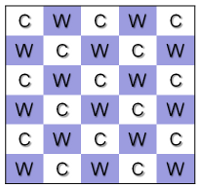Dr. Deming felt that this was so important that he devoted a whole chapter to this in his book, "Out of the Crisis" ó Chapter 9.
- Operational Definition converts concepts to actionable definitions
- Operational Definition puts communicable meaning into a concept
Dr. Percy Williams Bridgman, 1946 Nobel Prize in Physics Winner, an American physicist who graduated from and taught at Harvard University, wrote on the philosophy of science, and advocated operationalism, and he coined the term operational definition.
Here are some examples of what Iím talking about:

Purchase a fabric that is 50% wool and 50% cotton
- What does that mean?
- Or did you mean the wool should be mixed homogeneously throughout the cotton?
- Clearly whatís missing with the fabric example is operational definition

- If a homogeneous mixture of cotton and wool is required, then cut a small sample from the fabric and measure the wool and cotton content
- What would it mean if there was 48% wool and 52% cotton?
- Clearly thereís no such thing as exactly 50% wool and 50% cotton
- Operational Definition must contain clear statements of specified requirements
- Can the wool content range from 48-52%?
- How about the cotton?
For practical everyday life situations clear operational definition may be implicit and further definition not necessary. However, in business and industry the lack of clear operational definition is a major contributor to chaos. How can a worker know; how can they possibly know what is required without clear operational definition?
Here are other examples of what we are talking about:
Is this train always on-time?

- What does that mean?
- Does this mean that itís on-time except for the times itís not?
- Is 5 minutes early on-time?
- How about 5 minutes late?
- The statement ďon-timeĒ lacks clear operational definition.
- How precisely should we report arrival time?
- How about within 15 minutes; maybe 30 minutes?óOn-time keeps getting better
The patient is doing satisfactorily

- What does that mean?
- According to who?
- Compared to what?
- Would the doctor, the nurse, relatives, and the patient view this in the same way?
- Is there a clear operational definition for satisfactorily, and has it been clearly communicated?
- Operational Definitions are of little value unless they are clearly communicated.
- Clear communication begins with training.
- Training must be based on well-organized operational definitions.
- Well-organized operational definitions generally are purveyed in the form of procedures and control plans.
Examples of terms frequently used, but lacking operational definition:
- Serviceable
- Satisfactory
- "OK as-is"
- "Good to go"
- "Doing well"
- "Doesnít look good to me"
- Pass/Fail
- Good enough
- "The color must be red"
- Too long
- Too short
- "Just made it"
- To the naked eye
- Clean
- Dirty
- This list can be endless
- . . . What do you suppose endless means?
Many workers have been criticized, written up and even cashiered out of their job for unsatisfactory performance. I wonder how much of this is due to poor operational definition. How can they know; how can they possibly know? The answer is clear operational definition.
